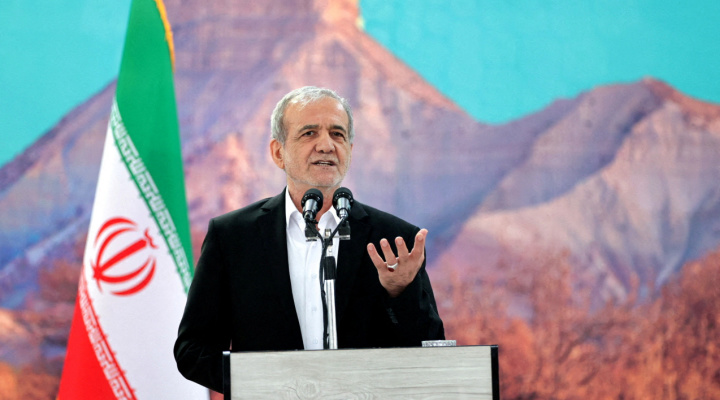Iranian President Masoud Pezeshkian speaks during a meeting in Ilam, Iran, June 12, 2025. Photo: Iran’s Presidential website/WANA (West Asia News Agency)/Handout via REUTERS
Iran’s President Masoud Pezeshkian warned against excessive water consumption which he said was untenable for the country and could leave Tehran facing severe shortages by September, semi-official Tasnim news agency reported on Thursday.
Faced with resource mismanagement and over-consumption, Iran has faced recurrent electricity, gas, and water shortages during peak demand months.
“In Tehran, if we cannot manage and people do not cooperate in controlling consumption, there won’t be any water in dams by September or October,” Pezeshkian said on Thursday.
The country has faced drought conditions for the last five years according to the director of the Environmental Protection Organization Sheena Ansari and the Meteorological Organization recorded a 40 percent drop in rainfall over the last four months compared to a long-term average.
“Neglecting sustainable development has led to the fact that we are now facing numerous environmental problems like water stress,” Ansari told state media on Thursday.
Excessive water consumption represents a major challenge for water management in Iran, with the head of Tehran province’s water and wastewater company Mohsen Ardakani telling Mehr news agency that 70 percent of Tehran residents consume more than the standard 130 liters a day.
Natural resource management has been a chronic challenge for authorities, whether it is natural gas consumption or water use, as solutions require major reforms, notably in the agricultural sector which represents as much as 80 percent of water consumption.
On Wednesday, Pezeshkian rejected a government proposal to impose a day-off on Wednesdays or having a one-week holiday during the summer, saying that “closing down is a cover-up and not a solution to the water shortage problem.”
In the summer of 2021, protests took place against water shortages in southwestern Iran.
Click this link for the original source of this article.
Author: Reuters and Algemeiner Staff
This content is courtesy of, and owned and copyrighted by, https://www.algemeiner.com and its author. This content is made available by use of the public RSS feed offered by the host site and is used for educational purposes only. If you are the author or represent the host site and would like this content removed now and in the future, please contact USSANews.com using the email address in the Contact page found in the website menu.





